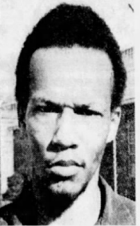 The Charlotte Observer (March 31, 1974) On June 19, 1973, two young men attempted to rob an Exxon service station in Charlotte, North Carolina. At the time of the attempted robbery, the station owner, Raymond B. Williams, and longtime employee James D. Sloop were working. One of the robbers pulled out a sawed-off shotgun, pointed it at Williams, and demanded money. When Sloop said he would not give the robbers anything, the gunman shot Sloop in the stomach. The two robbers fled the scene. After multiple surgeries for his injuries, Sloop died 13 days later.
In early July 1973, 15-year-old James Calvin “Peanut” Mitchell was arrested in connection with Sloop’s murder. The arrest came out of an anonymous tip called in by someone seeking the $5,000 reward offered by Sloop’s employer. Mitchell agreed to a deal in which he would plead guilty to second-degree murder, thereby avoiding the death penalty, in exchange for testifying against the four men he identified as his accomplices in the crime: Harold Givens, Antonio Dorsey, and brothers Albert and Anthony Carey.
Mitchell’s signed confession said that he planned the crime with the four other men and that he and Givens entered the service station with a gun provided by Albert Carey while the Careys and Dorsey waited in the getaway car. After signing a waiver of his rights, including his right to counsel, 20 year-old Anthony Carey signed a statement saying he was in the car with the four other men on the day of the crime but did not participate.
The first of Mitchell’s co-defendants to stand trial was Anthony Carey. His jury trial began in early November 1973 in Mecklenburg Superior Court with Judge Sam J. Ervin III presiding. Assistant District Attorney Peter S. Gilchrist III prosecuted the case, and attorney Gene H. Kendall represented Carey.
The state’s case against Anthony Carey rested on Mitchell’s testimony that Carey was involved in the crime. Mitchell testified that Carey was in the car with him and the three other co-defendants the day before the crime, when the crime was being discussed. He testified that Carey then waited in the getaway car while the attempted robbery and subsequent shooting occurred. Williams, the station owner, testified at the trial, identifying Mitchell as the shooter but saying he did not get a good look at Mitchell’s companion.
Anthony Carey testified that he was not involved in planning the robbery or the crime itself and that he had not learned of the crimes committed by Mitchell until a month later, when it became “common knowledge” in his community. On November 8, 1973, the jury found Carey guilty of conspiracy to commit armed robbery and first-degree murder. He was sentenced to death for the murder and 1o years in prison for the robbery conspiracy.
On November 27, 1973, Mitchell took the stand at Givens’s trial, and now testified that he was not involved in Sloop’s murder and did not know who had committed the crime. With no other evidence against Givens, the prosecution dismissed the charges against Givens. Gilchrist also dropped the charges against Dorsey, though he did so with the option to reopen.
On December 6, 1973, Mitchell testified at Albert Carey’s trial, where he was charged with first-degree murder, conspiracy to commit armed robbery, and attempted armed robbery. Mitchell changed his testimony again, now testifying that he, the Carey brothers, Givens, and Dorsey planned and carried out the robbery that ended in Sloop’s murder. Regarding his contradictory testimony at Givens’s trial, Mitchell testified that he was afraid of testifying against Givens or Dorsey, with whom he said he had shared a jail cell.
Albert and Anthony Carey appealed their convictions. On July 1, 1974, the Supreme Court of North Carolina granted the brothers new trials because Judge Ervin didn’t allow their attorneys to question prospective jurors about their feelings on the death penalty.
Albert Carey’s second trial took place in December 1974. Mitchell took the stand and changed his story again, now testifying that he acted alone in robbing and killing Sloop. Judge Frank S. Snepp asked Gilchrist to prepare Mitchell’s perjury indictment, stating, “there is no way to know the truth in this matter, but in one way or another, [Mitchell] has made a complete mockery of our criminal justice system.” Gilchrist introduced a signed statement by Albert Carey’s wife indicating that he knew Mitchell, but she testified to say that the statement was untrue and Albert Carey did not know Mitchell. She testified that he was with her at his father’s house at the time of the crime. A police officer testified that Albert Carey had admitted to him that he helped Mitchell plan and carry out the robbery. Albert Carey testified that he did not know Mitchell and was not involved in the crime. On December 19, 1974, the jury found Albert Carey guilty of first-degree murder and conspiracy to commit armed robbery. Judge Snepp sentenced him to death. His sentence was commuted to life in prison in 1976 after the U.S. Supreme Court struck down North Carolina’s death penalty statute.
The prosecution dismissed the charges against Anthony Carey and Dorsey on the same day as Albert Carey’s conviction.
- Meghan Barrett Cousino
|